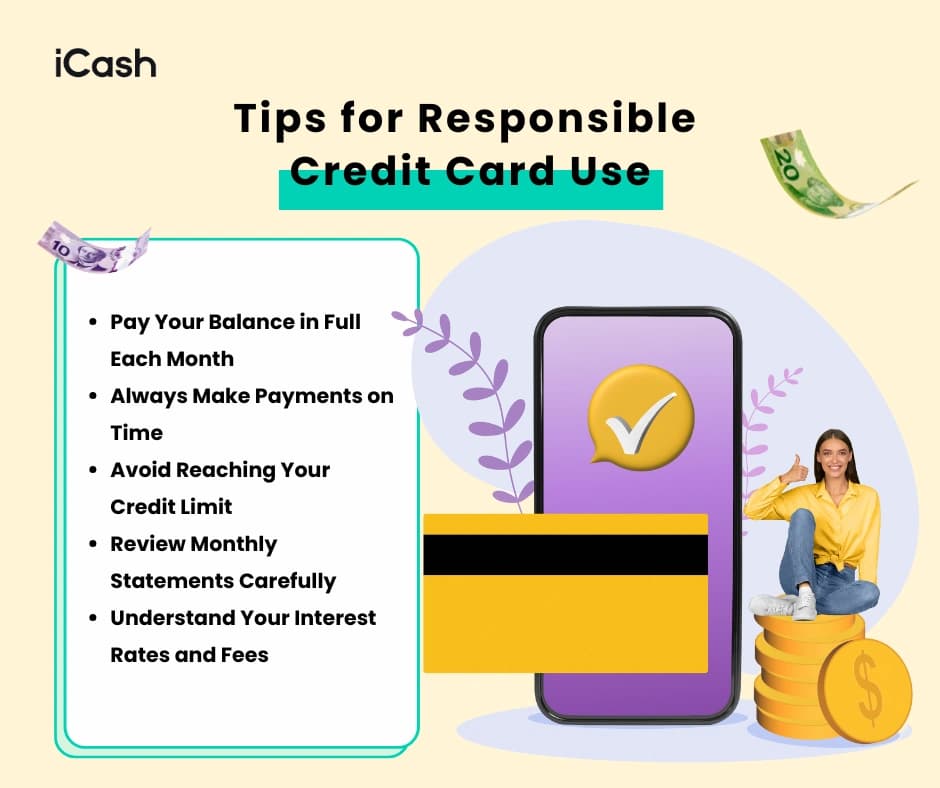If you’re reading this, you likely already have a credit card or might be thinking about applying for your first one. Either way, that’s fantastic because credit cards can be great tools for managing your finances and even building up your credit score, which in turn can lead to better financial opportunities in the future.
However, they can also lead to financial trouble if not used carefully. That’s why understanding how to use a credit card and learning how to use it responsibly is so important.
For this blog, we’ll walk you through the basics of credit cards, explain how you can use a credit card to build your credit and share tips to help you avoid common mistakes. We’ll also include info on how to make the most of various credit card perks, like cashback and rewards!
How Credit Cards Work (In a Nutshell)
At their core, credit cards work by letting you borrow money from a lender, up to a set credit limit, to make purchases or pay bills.
Every month, you’re going to receive a credit card statement (either online or by mail). On that statement, you’ll have a detailed list of what you’ve purchased, any applicable interest charges, and the minimum payment you need to make. You'll also see information about your overall credit card balance.
There are a few key terms to know. Your credit limit is the maximum amount you can borrow, while your annual percentage rate (APR) determines how much interest you’ll pay if you carry a balance. Minimum payments are the smallest amount you’re required to pay each month, but paying only the minimum can lead to high-interest debt over time.
The best way to be responsible with your card is to pay it on time and keep your balance low compared to your credit limit (which is referred to as your credit utilization ratio). Low utilization shows lenders you’re managing credit well, which can boost your credit score.
Tips for Responsible Credit Card Use
Using your credit card responsibly can help you build your credit while taking advantage of various financial opportunities. Here are a few tips to help you stay on top of it all, while still getting the most out of your card.

Pay Your Balance in Full Each Month
While this isn’t always a possibility for people, if you can, paying off your full credit card balance every month not only shows responsible financial behavior, but it allows you to avoid paying any interest fees which can quickly add up over time if you aren’t careful.
By paying in full, you avoid these charges and free up your credit limit for other expenses. But again, If paying the full balance isn’t possible, try to pay as much as you can to minimize interest charges.
Always Make Payments on Time
Making your payments on time is arguably more important than paying your balance off in full. Why is that? Late payments can lead to a few unwanted things like late fees, increased interest rate charges, and negative hits to your credit report.
The good news is that most credit cards have features like automatic payments, that way you don’t even have to think or remember to pay your bill. Alternatively, you can probably just set up reminders on your smartphone. Just remember that even one late payment can have negative consequences, so being punctual is in your best interest.
Avoid Reaching Your Credit Limit
While it might be tempting to use all of your credit card limit, doing so can harm your credit score. High credit utilization (using a large portion of your available credit) tells lenders that you might be financially overextended, so it's never a good idea to use your entire credit card balance.
Review Monthly Statements Carefully
When you get your credit card bill each month, take some time to review it carefully. By examining it closely, you’ll be able to detect errors and find any potential unauthorized charges or fraud.
It’s also a good way to monitor your spending habits and adjust your budget if necessary. If you notice something unusual, report it to your credit card company immediately to protect your finances.
Understand Your Interest Rates and Fees
Every credit card comes with terms you should understand, especially when it comes to interest rates and fees. The annual percentage rate (APR) determines how much interest you’ll pay if you carry a balance, while fees like annual charges, late payment fees, or cash advance fees can add unexpected costs. Familiarizing yourself with interest rate details can help you avoid surprises.
Using Credit Cards to Build Credit
Whether you’re building your credit score from scratch or rebuilding it, credit cards can truly help you boost it up, provided you use it responsibly. Keeping your credit card utilization low, paying your bills on time, and avoiding excessive credit inquiries are all things that can help. But here are a few other things that can also do the trick:
Keep Your Oldest Card Open
This is probably one of the more overlooked aspects of credit building, but keeping your oldest credit card account open, even if you don’t use it regularly, plays a huge part in helping you build your credit.
This is because keeping your oldest credit card open and active demonstrates a long-standing, stable credit record. Even if you no longer use the card, maintaining it can help strengthen the "credit age" factor in your credit profile. If the card has no annual fee, it’s a no-brainer to keep it open and positively impact your score.
Limit New Credit Applications
We get it - applying for multiple credit cards is incredibly tempting, but doing so can negatively impact your credit score and your overall credit history. Each application results in a hard inquiry, which can lower your score temporarily. Multiple new accounts can shorten your average credit age, potentially undoing your progress.
Instead, focus on responsibly managing your credit cards and applying for new credit only if it’s absolutely necessary.
Earning Rewards with Credit Cards
These days, most credit cards come with rewards and/or cashback, which can be huge bonuses to take advantage of while using your card to help build your credit. Whether you prefer direct cashback, points, or travel perks, leveraging credit card rewards strategically can make your spending more rewarding. Take some time to do a bit of research and pick a card that fits with your lifestyle.
Maximize Cashback Opportunities
Many credit card companies offer various perks, but the biggest one you’ll find most often is cashback. It’s the simplest and most popular type of credit card perk. With a cashback card, you can get cash back on things you care about such as groceries, gas, or dining.
Some cards even offer rotating bonus categories or tiered reward structures, so planning your purchases accordingly can boost your returns. But remember that you should always pay off your balance in full each month so that you’re benefiting as much as possible from cashback without incurring interest charges.
Take Advantage of Additional Perks
Beyond cashback and points, many credit cards come with additional perks that may include travel rewards like free flights or hotel stays, extended warranties, purchase protections, or exclusive discounts with specific merchants.
Managing Credit Card Safety and Security
Another important aspect of owning a credit card is doing everything you can to protect your finances and personal information. In fact, in 2023, 60% of Canadians said they were recently targeted with fraud. That number isn’t meant to scare you, but simply point out the importance of protecting yourself and your finances. Here are a few ways you can do that.
Set Up Alerts and Notifications
One of the easiest ways to stay on top of your credit card security is by setting up electronic alerts. Many credit card providers allow you to customize your credit card statement notifications for various activities, such as purchases over a certain monetary amount, due dates, or potential fraud.
Setting up these alerts will help you identify any concerning transactions as quickly as possible and take the steps necessary to put a halt to anything unauthorized. That peace of mind can make all the difference.
Keep Personal Information Secure
No, “12345678” is not a strong password. The best way to protect yourself online is to create strong passwords that use a variety of letters, numbers, and special characters.
Be cautious when sharing sensitive information online and check the websites you use are secure (look for “https” in the URL). Also, avoid accessing financial accounts over public Wi-Fi. These networks usually have minimal protection and can be vulnerable to hackers.
Frequently Asked Questions (FAQs) about Credit Card Use
What happens if I only pay the minimum balance on my credit card?
Paying only the minimum balance keeps your account in good standing, but it results in accruing interest on the remaining balance. Over time, this can increase your total debt. To save money and pay off your balance faster, try to pay more than the minimum each month.
How can I avoid paying interest on my credit card?
To avoid paying interest, pay your full statement balance by the due date each month, that way you’re not charged interest on purchases. Understanding your card’s grace period and avoiding cash advances can help you maintain interest-free use of your card.
What is a good credit utilization ratio, and why does it matter?
A good utilization ratio is typically 30% or lower, meaning you use no more than 30% of your available credit limit. This ratio is important because it impacts your credit score; lower utilization shows responsible credit management to other institutions like banks.
Can using a credit card help improve my credit score?
Yes, but you need to use your credit card responsibly. Timely payments and maintaining a low utilization ratio are the best ways to do that. Also, keeping credit card accounts open long-term and avoiding excessive new applications will help you have a positive credit history.
What should I do if my credit card is lost or stolen?
If your credit card is lost or stolen, report it immediately to your credit card issuer to prevent unauthorized charges. Most companies offer 24/7 support for such situations. Also, don’t forget to monitor your account for suspicious activity and update your online accounts with the new card information once it’s replaced.











